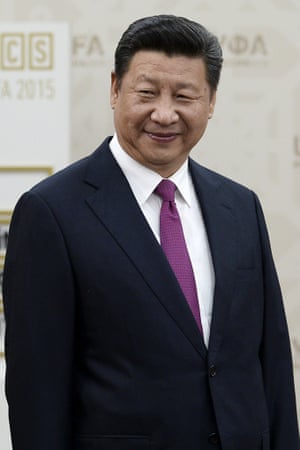President Xi Jinping will enjoy the pomp of a state visit this week, but our obsession with the country is misguided

China isn't the only place in the world to do business. Photograph: FREDERIC J. BROWN/AFP
Sunday 18 October 2015 00.05 BSTLast modified on Sunday 18 October 201509.18 BST
Chinese culture is amazing. Chinese people are creative, entrepreneurial, inspiring. I know from my experience and from friends, whose judgment I trust completely, that China is a great and special country that we should be happy and proud to engage with. There’s only one problem: it’s run by a bunch of cruel, corrupt, communist dictators.
They preside over vicious abuse of women through the mass barbarism required to enforce the one-child policy (relaxed, but still in operation); the imprisonment and execution of dissidents for speaking their minds and the more pervasive appurtenances of an authoritarian police state – surveillance, paranoia, Orwellian mind-control efforts. That’s just at home. Internationally, the Chinese regime steals commercial secrets, hacks government and private sector computer systems andthreatens its neighbours.
Is a government that goes around forcibly inserting intrauterine devices into the bodies of its female citizens, or forcing them to have abortions, one we should be rolling out the red carpet for? How would the men (and it’s mostly men) involved in the unseemly stampede to make money in China feel if it was happening to their wives, their girlfriends? China is even more corrupt than the EU or Washington DC and that’s saying something.
Surely we should be fighting corruption in the world, not feeding it with fat contracts that filch the earnings of British taxpayers to fund the lavish lifestyles of sleazy Chinese elites. With other rogue states, such as Iran and Russia, we apply economic sanctions to incentivise better behaviour and enforce international order and civilised norms. It’s high time we did the same to China: instead of trade deals, tough sanctions; instead ofsucking up to the despots of Beijing, we should stand up to them. For moral reasons and on the grounds of national and international security. But, perhaps surprisingly, it’s in our economic interests, too.
This is an emotional issue for me. My family is from Hungary and I loathe communism, authoritarianism and dictatorship. However, I’ll put principle aside for a moment and focus on the practical. The argument is that engagement works: “Let’s do business with China, and where economics lead, freedom will follow.” It’s a reasonable idea. Let’s see how it’s working out.
According to Human Rights Watch, in its2015 report on China, the authorities have “unleashed an extraordinary assault on basic human rights and their defenders with a ferocity unseen in recent years, an alarming sign given that the current leadership will likely remain in power through 2023”. Hmm. We were told that China’s new leadership would bring an era of openness. We were told the same about the 2008 Olympics. We keep being told that engaging with China will deliver the changes we want to see. But it never happens. That’s because brutal, autocratic regimes are best dealt with through strength. Sustained confrontation toppled the Soviet empire. Sanctions ended apartheid. Now we need that kind of robust approach to China today.
Some might say: “We confronted the Soviets because they directly threatened us. It’s not our job to improve life in other countries – China may treat its own people terribly, but they’re no risk to us.” Really? China is a superpower, aggressively spreading its influence. Our security and economic opportunity depend on an orderly world, underpinned by the values of openness. We need to stand up, strongly, for openness. If the world slides towards the opposite values, those of the Beijing dictators, we should be very nervous. That’s not fashionable these days. Foreign policy“experts” tend to support the values-free, Kissingerian approach to international relations. Now, some people call Kissinger a war criminal. I think it’s worse than that: he was just not very good at foreign policy.

China’s President Xi Jinping: ‘Imposing economic sanctions on China is not “anti-business”.’ Photograph: PR
Accommodation with China gives up our leverage in pushing for the best guarantee of our security: a more open global society and economy. The “serious” people would be the first to condemn CND’s unilateral nuclear disarmament as “something for nothing” negotiation. But when it comes to China (and Saudi Arabia too, incidentally), they seem to believe in unilateral moral disarmament.
The “wise men” also say: “Yes we should raise human rights with the Chinese leadership, press for reform. But do it subtly, behind closed doors.” Because that’s working so well, right? Rather brilliantly, the Chinese autocrats have spun a cultural norm (Chinese people need to preserve “face”) into self-censorship on our part.
Of course the Beijing oppressors would prefer not to be lectured in public on human rights. But if a convicted murderer said he’d prefer not to be lectured in public on the morality of killing people, would we say: “OK, we’ll keep your verdict secret”?
Another argument is that economic engagement has lifted millions of Chinese people out of poverty. Sanctions or economic boycotts would halt that. But it’s capitalism that lifts people out of poverty and the Chinese authorities are welcome to continue with it. Capitalism and globalisation are not dependent on China. Imposing economic sanctions on China is not “anti-business”. (I’m the most pro-enterprise person you’ll meet): it is in our economic interests. Talk to people who do business in China and they’ll tell you it’s a nightmare. Better opportunities lie elsewhere, but we’re missing them because of an obsession with China.
How low an opinion of our commercial flair do we have if we think we’re doomed unless we do deals with one country? What about India? The fastest-growing region in the world is Africa. Why prioritise disgusting dictators when there are decent democracies with more consumers, more business partners – yes, more money to be made – than in China and where we don’t have to endorse state-sponsored depravity?
None of this is to condemn entrepreneurs and business leaders who build successful operations in China: I have nothing but admiration for them. Within the rules we have, companies should be in China, but the rules need to change. Frankly, I would like my business, Crowdpac, to be in China. Oh wait, our mission is to increase political participation and enhance democracy. I’m not sure we’ll be that welcome.
One last thing. Some will try to interpret this article as an attack on George Osborne, who has made engagement with China a centrepiece of his economic strategy. They would be dead wrong: George is a good friend and friends are allowed to disagree. I support him with all my heart, although on China we differ. Big deal; I think he can cope.
This is not a choice between money and morals. By standing up to the Chinese regime we can assert our commitment to decency and avoid the embarrassment of overlooking behaviour we know to be repugnant. By pivoting our trading focus to parts of the world that offer more economic opportunity with less risk to our security, we can guarantee a more stable and prosperous future. It’s called progress and we ought to be on its side.
http://www.theguardian.com/commentisfree/2015/oct/18/kowtowing-to-china-does-nothing-for-british-economic-health